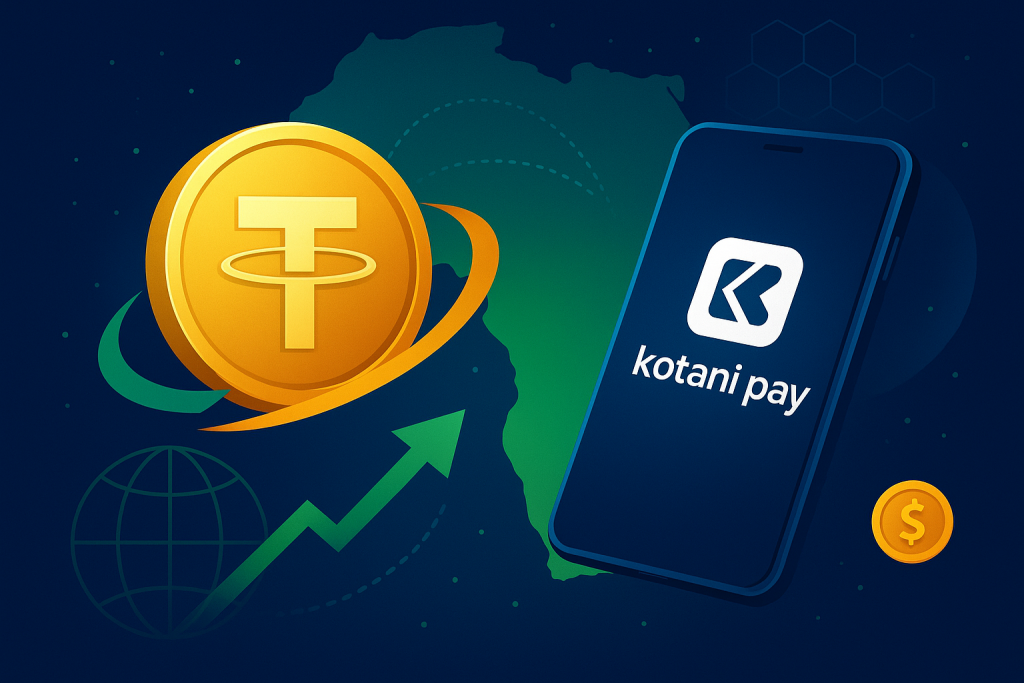Tether Strengthens Its African Presence
Tether, the company behind the world’s largest stablecoin USDT, has announced a strategic investment in Kotani Pay, a Kenyan fintech startup building digital infrastructure that connects traditional finance with Web3.
The partnership aims to expand access to blockchain-based financial tools and reduce barriers for African users and businesses to participate in the global economy. Together, the two firms plan to accelerate the growth of an on-chain payment ecosystem across the continent.
“We believe blockchain technology plays a critical role in unlocking financial freedom,” said Paolo Ardoino, CEO of Tether.
“Kotani Pay’s vision and strong local presence make it the ideal partner for advancing our shared mission in Africa and beyond. Together, we aim to empower businesses and individuals to use digital assets for global transactions and build a more inclusive financial future.”
Kotani Pay: Bridging Traditional Finance and Web3
Founded in Kenya, Kotani Pay has become one of Africa’s most promising fintech innovators. The startup develops infrastructure that allows on-chain transfers without internet connectivity, enabling crypto payments via mobile phones — a breakthrough for regions with limited internet access.
In September 2023, Kotani Pay raised $2 million to scale its offline crypto payments technology. With Tether’s backing, the company is now positioned to expand its network and connect millions of users to the global financial system.
“This strategic partnership with Tether allows us to continue serving as a bridge to the on-chain economy,” said Felix Macharia, CEO and co-founder of Kotani Pay.
“By joining the Tether ecosystem, we can leverage shared expertise to develop financial tools that enhance prosperity for African individuals and businesses.”
Africa: Fastest-Growing Crypto Region
According to data from Chainalysis, Sub-Saharan Africa remains the world’s smallest crypto market by volume — yet it shows the fastest growth in user activity.
From July 2024 to June 2025, on-chain transaction volumes exceeded $205 billion, up 52% year-over-year.
The main growth drivers include:
- Remittances and cross-border payments
- Business transactions using stablecoins
- Hedging against inflation and currency volatility
Countries like Nigeria, Kenya, South Africa, and Ethiopia have become regional crypto hubs, where digital currencies offer real-world financial utility amid limited access to traditional banking services.
Expanding Financial Inclusion
Tether’s investment in Kotani Pay is part of its broader strategy to foster financial inclusion and develop digital infrastructure in emerging markets.
Earlier initiatives include:
- Launching YellowCard USDT payment cards (March 2023), enabling users to transact in stablecoins without bank accounts.
- Deploying hashrate capacity via OCEAN mining operations in remote African regions (April 2025).
- Partnering with Quidax to introduce a crypto literacy program in Nigeria.
With the Kotani Pay partnership, Tether aims to further bridge the gap between traditional finance (TradFi) and decentralized finance (DeFi) by supporting efficient, transparent, and inclusive payment systems.
Toward a Blockchain-Powered Africa
Tether emphasizes that the collaboration will serve as a catalyst for digital transformation, enabling businesses and individuals to access global financial tools more easily. By strengthening local infrastructure, the companies seek to lower remittance costs — currently among the highest in the world — and open new channels for economic growth.
Tether’s investment in Kotani Pay underscores a growing trend of strategic fintech collaborations aimed at driving blockchain adoption across Africa. The move highlights the continent’s pivotal role in the next wave of crypto-powered financial innovation.


